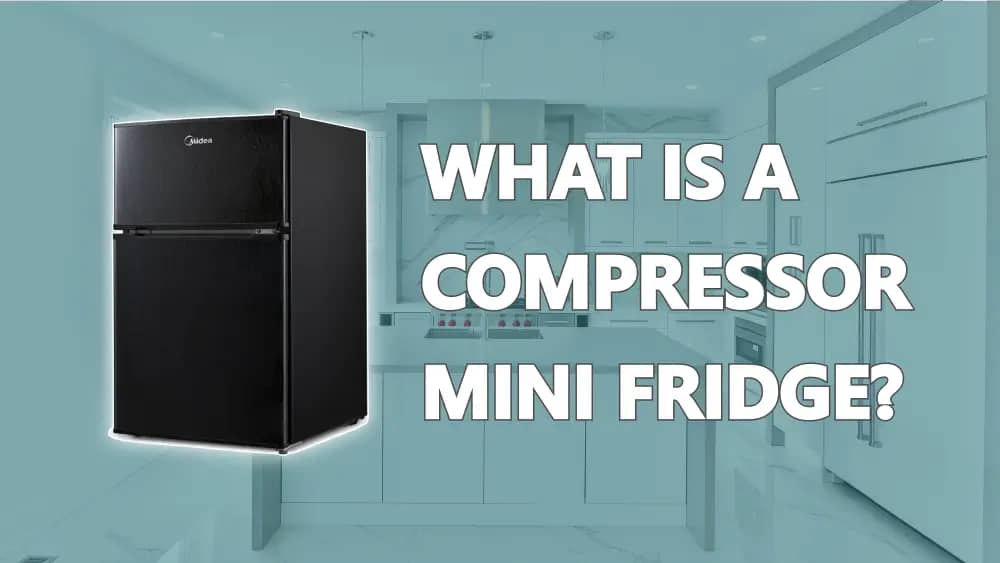If you’ve been on the hunt for a mini fridge, you may have come across the terms “compressor mini fridge” and “thermoelectric mini fridge.” While both types serve the purpose of cooling, they operate on different principles. In addition, both cooling mechanisms have their own advantages and disadvantages like most things in life. Let’s take a closer look at compressor mini fridges to understand what they are and how they work.
What is a compressor mini fridge?

A compressor mini fridge is a type of small appliance that utilizes a mechanical compressor and a refrigerant system to generate and maintain certain temperatures inside the fridge. The compressor plays a key role in compressing the refrigerant gas, which increases its pressure and temperature. This high-pressure gas then flows through coils, dissipating heat and converting it into liquid. The liquid refrigerant then passes through an expansion valve, where it rapidly expands, causing it to cool down significantly. As a result, the cooled refrigerant absorbs heat from the interior of the fridge, lowering the temperature.
The compressor system, commonly found in regular refrigerators and larger mini fridges, uses a compressor and refrigerant to cool the interior. The compressor pressurizes the refrigerant gas, causing it to release heat and condense into a liquid. The liquid refrigerant then evaporates inside the fridge, absorbing heat and cooling the space. This system provides powerful cooling capabilities, precise temperature control, and the ability to reach very low temperatures.
Advantages of Compressor Mini Fridges
Compressor mini fridges offer several advantages and people prefer them for their powerful cooling capabilities. Here are some advantages of getting a compressor mini fridge:
Effective Cooling: Compressor systems provide powerful and efficient cooling, allowing for quick temperature reduction and maintenance of desired cooling levels.
Wide Temperature Range: Compressor mini fridges have a broader temperature range, making them suitable for both refrigeration and freezing purposes. They can achieve colder temperatures compared to thermoelectric mini fridges.
Consistent Cooling Performance: Compressor systems maintain a more stable and consistent temperature, ensuring that items inside the fridge remain properly chilled or frozen.
Faster Cooling Recovery: If the door is opened frequently or if the fridge is exposed to warm air, compressor mini fridges recover their cooling capacity quickly and efficiently.
Spacious Storage: Compressor models often come in larger sizes, offering more storage capacity and adjustable shelving options to accommodate a variety of items.
Versatility: Compressor mini fridges are versatile and suitable for various applications, including residential use, commercial settings, offices, and dorm rooms.
Better Performance in Hot Environments: Compressor systems are less affected by ambient temperature variations, making them suitable for use in hotter climates or environments.
Freezer Capability: Many compressor mini fridges come with a dedicated freezer compartment, allowing you to store frozen food items conveniently.
Longevity: Compressor systems are known for their durability and longevity, making them a reliable choice for long-term use.
Energy Efficiency: Modern compressor mini fridges come with energy-efficient features and technology, helping to reduce electricity consumption and save on utility costs.
Disadvantages of Compressor Mini Fridges
Like many things in life, compressor mini fridges do come with a few drawbacks that are worth considering when purchasing one:
Noise: Compressor systems can generate noise while running, which can be noticeable in quiet environments or smaller spaces. However, that depends on the brand, and model among other things. Not all compressor fridges produce noise.
Size and Weight: Compressor mini fridges are generally larger and heavier compared to other types of mini fridges, which may limit their portability and require more space for installation. However, despite their larger size, they are still considered compact appliances, as the term “mini” suggests.
Energy Consumption: Compressor systems tend to consume more energy compared to thermoelectric or absorption systems, resulting in higher electricity bills.
Initial Cost: Compressor mini fridges are often more expensive compared to other types of mini fridges, which can be a deterrent for budget-conscious buyers.
Maintenance and Repairs: Compressor systems may require regular maintenance, such as cleaning coils and changing filters. And when they malfunction, repairs can be more complex and costly compared to other cooling systems.
Sensitivity to Inclines: Placing compressor mini fridges on an incline or uneven surface can significantly impact their performance and prevent them from operating optimally. This is due to the design and mechanics of compressor systems. When a compressor fridge is not on a level surface, it can cause strain on the compressor, affecting its efficiency and potentially leading to malfunctions.
Defrosting Needs: Compressor mini fridges require periodic defrosting to remove ice buildup in the freezer compartment, which can be time-consuming. Similar to their big counterparts that also use a compressor in order to work.
Environmental Impact: If the refrigerants inside the compressor system are not handled or disposed of properly, it can cause environmental issues like ozone depletion and the release of greenhouse gases.
Limited Mobility: Due to their larger size and heavier weight, compressor mini fridges are less portable and may not be ideal for on-the-go lifestyles or frequent relocation.
Start-Up Delay: Compressor systems often have a brief start-up delay before they begin cooling, which can be noticeable when accessing items immediately after opening the fridge. On the contrary, thermoelectric mini fridges do not require a lot of time to start up.
Are Compressor Mini Fridges Good?
Compressor mini fridges are generally considered to be a good cooling option for various reasons. They offer powerful cooling capabilities, allowing for efficient temperature control and the ability to maintain consistent cooling even in warmer environments. Compressor mini fridges also provide a wide temperature range, making them suitable for storing a variety of items, including perishable foods and beverages.
Additionally, they tend to have larger storage capacities compared to thermoelectric mini fridges, providing ample space for your cooling needs. However, it’s important to consider factors such as energy efficiency, noise levels, and specific features when choosing a compressor mini fridge to ensure it meets your individual requirements and preferences.
Ultimately, the choice of whether compressor mini fridges are good or not will depend on your specific needs and preferences.
Final thought. In conclusion, despite a few drawbacks, compressor mini fridges remain an excellent choice for individuals seeking a compact refrigeration solution. Their small size makes them ideal for apartment dwellers or those with limited space. If you take good care of your compressor mini fridge, it can serve you faithfully for many years without any issues.

With over 15 years of experience in the appliance industry, I am a passionate advocate for efficient and stylish mini fridges. I specialize in energy-saving models and compact living solutions. As a certified appliance repair technician, I have a deep understanding of mini fridge maintenance and troubleshooting.


2 thoughts on “What is a Compressor Mini Fridge?”